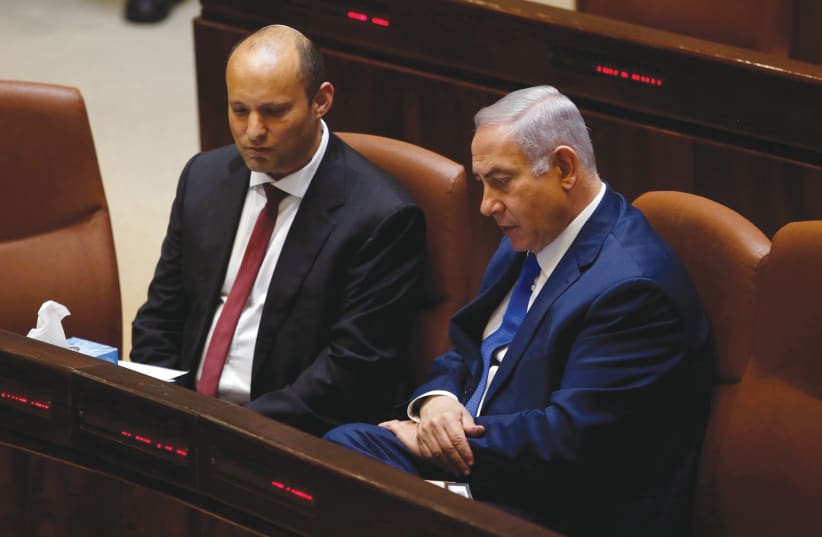In Israel, the news is more of a split screen between the Jerusalem’s Old City and its Givat Ram neighborhood, home of the Knesset.
For the past few weeks, there has been a very solid line between the two sides of that screen, with few of the major players on the domestic political side crossing over to the side of the conflict.
But Monday’s events serve as a Middle East reality check, showing that no Israeli government can avoid diplomatic and security issues, even if it really wants to.
Prime Minister Benjamin Netanyahu lost the mandate to form the next government and opposition leader Yair Lapid got it last week – that did make some international headlines – and he and others are working to swear in a “change coalition” as soon as possible, some even saying this week.
Lapid and Yamina leader Naftali Bennett are working on leading a sort of Franken-government, sewn together from pieces of other, dead coalition options. There’s Yamina and New Hope on the Right, Lapid’s Yesh Atid and Blue and White in the Center and Labor and Meretz on the Left, all wrangling for their piece of the cabinet pie, with some outside support from Ra’am and\or the Joint List.
The mantra that leading members of this potential hodgepodge coalition keep repeating is that they will only deal with civilian issues.
The past few years under Netanyahu’s leadership have been relatively quiet, with some saying the last year was the most peaceful in Israel’s history. It has been a long time since it looked like there will be serious negotiations with the Palestinians, so territorial concessions are not on the table, and initiatives to extend Israeli sovereignty in Judea and Samaria were shelved with the advent of the Abraham Accords.
As such, people like Bennett and Meretz leader Nitzan Horowitz, who are almost as far away as two party leaders can be on security and diplomatic issues, apparently thought they could just put them aside for a couple of years in order to bring domestic political stability.
Yet the past few days have been a wake-up call, culminating in the salvo of rockets from Gaza and red alert sirens wailing across Jerusalem in the middle of the Jerusalem Day flag march.
Before dozens of rockets were launched into Israel, the remarks from people like Labor leader Merav Michaeli and Yisrael Beytenu leader Avigdor Liberman were mostly been blaming Netanyahu for not doing enough to prevent the upheaval in Jerusalem.
Soon after the red alert went off in the Knesset, New Hope leader Gideon Sa’ar called for a “sharp response to bring back deterrence.” Lapid said "Israel must act resolutely and strongly to restore deterrence." Bennett called to "fight the Palestinian terror with an iron fist." All three said they would support a decision by the current, Netanyahu-led government in that vein.
By press time, Michaeli and Horowitz hadn’t reacted, but it’s likely they would be less supportive – though Labor could go either way. Earlier Monday, Labor and Meretz MKs took part in a conference supporting the Palestinian residents of Jerusalem.
An even bigger problem is that the aforementioned factions only make up 57 seats – that’s excluding Yamina MK Amichai Chikli who said he’d vote for a coalition with the Left – and can only have a majority with outside support from an Arab party.
Yet Ra’am leader Mansour Abbas, who ran on his openness to cooperation with Zionist parties in order to promote a domestic agenda for his constituents, decided to suspend negotiations until things calm down. That is a blow to the “change coalition” and a boost for those, like Religious Zionist Party leader Bezalel Smotrich, who have said all along that a government relying on an Arab party would not last once the conflict with the Palestinians heats up again.
Netanyahu has a talent of finding ways to benefit politically from situations that seem bad for him, and the current conflagration may be no different, in that it could be an obstacle to his rivals building a coalition to remove him from office.
However, contrary to what some commentators have said, that does not mean that Netanyahu somehow incited this violence; under his leadership, the government stopped Jews from visiting the Temple Mount on Jerusalem Day, and Attorney-General Avichai Mandelblit asked the High Court of Justice to postpone a ruling on whether to evict Arab residents of Shimon Hatzadik\Sheikh Jarrah in Jerusalem until things quiet down.
Still, when it comes to domestic politics, the rioting in Jerusalem and the rockets from Gaza only serve to highlight the shaky grounds on which the alternative, Netanyahu-free government would be built. The realities of the Middle East may make the nascent “change coalition” stumble before it even had a chance to stand.
